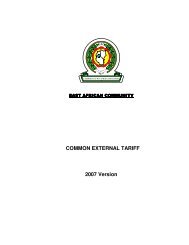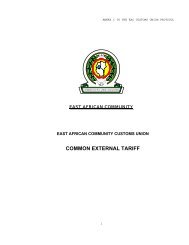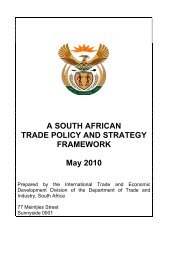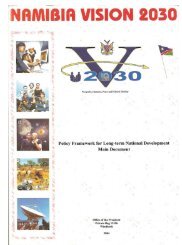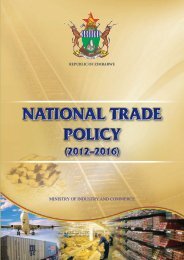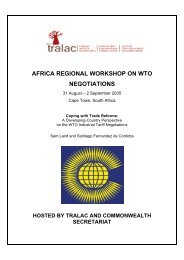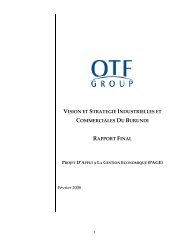rwanda national export strategy - minicom
rwanda national export strategy - minicom
rwanda national export strategy - minicom
You also want an ePaper? Increase the reach of your titles
YUMPU automatically turns print PDFs into web optimized ePapers that Google loves.
RWANDA NATIONAL EXPORT STRATEGY<br />
Sector Federation (PSF). Service providers are divided into two categories: the first category is ICT<br />
services, including systems integration, infrastructure, consultancy and software development. The second<br />
category is other business services including finance, administration, human resources and marketing<br />
services. The cluster can create an opportunity for major productivity improvements by focusing on<br />
Greenfield investments, such as Cloud Computing.<br />
Cloud computing is a potential transformative industry for internal productivity improvements and for<br />
<strong>export</strong> activity. Cloud computing is Internet-based computing, when computing tasks are assigned to a<br />
combination of remote connections, software and services on demand. End-users no longer need<br />
expertise in, or control of the technology infrastructure. The technology and skills are located and<br />
managed remotely. Organizations can buy access to IT resources from cloud providers on a pay-by-usage<br />
basis. A good Internet connection is required to remotely access the IT infrastructure that is located in the<br />
cloud provider‘s data center. Rwanda will soon have the infrastructure to take advantage of this growth<br />
industry. Rwanda‘s new <strong>national</strong> data center will be fully functional by 2011, and the new fiber optic<br />
cable is being installed, allowing firms quick access to this infrastructure. Domestic cloud providers will<br />
be able to offer access to IT services for a lower cost than an on-premise IT infrastructure. This low cost<br />
is achieved by the cloud provider‘s ability to share IT infrastructure among a large number of consumers,<br />
and by utilizing efficient IT service management.<br />
Priority Issues and Challenges<br />
Issue #1 A major constraint to the progress of the BPO cluster is the lack of a strong domestic ICT<br />
and business skills base. Employers in Rwanda have often complained that the skills produced by<br />
Rwandan institutions are not properly aligned to the skills needed in the private sector. 59 Domestic ICT<br />
programs lack breadth and practicality and do not provide accessible certification courses. Since Rwandan<br />
employees require additional training, which is often done by the hiring company, they are more<br />
expensive than their East African counterparts. Many ICT firms in Rwanda hire labour from Kenya,<br />
where experienced professionals are looking for regional opportunities, due to the competition and weak<br />
demand for labour in their local market. Often the training for the employed Rwandan graduates is not<br />
held in Rwanda, and the company pays the cost of sending employees abroad for training. Finally, the<br />
cost of existing ICT certification courses is prohibitive to students. As a <strong>strategy</strong> to compensate for the<br />
skills gap, there are a number of certified courses currently offered by universities, e.g. KIST offers<br />
CISCO, Microsoft, and LINUX training. The cost of CISCO courses is included in the regular tuition, but<br />
Microsoft and LINUX courses are not. These courses are prohibitively expensive for most students. Low<br />
enrolment means KIST is struggling to provide them. To address this issue it is necessary to find lowercost<br />
solutions to training Rwandan students in the necessary systems.<br />
Issue #2 Infrastructure deficiencies, particularly in ICT, create an unfavourable business<br />
environment for domestic service providers and inter<strong>national</strong> investment. Electricity tariffs and telephone<br />
costs are approximately double the regional average, 60 and while the connection to the fibre optic cable<br />
should be soon operational, and reduce the cost of connectivity, infrastructure costs remain a constraint.<br />
Issue #3 Rwandan service providers face challenges accessing working capital and funding for<br />
growth. When domestic firms are awarded contracts, the small advance they receive from the contractor<br />
is often not enough to complete the services. Compounding the issue, some firms may require a guarantee<br />
from the provider in order to ensure that the work is completed. The ICT sector could work with the<br />
financial sector to develop financing strategies to assist firms to access working capital on specific<br />
contracts, through a credit service bureau. Additionally, start-up service firms often cannot expand due to<br />
finance issues. The growth of the sector depends on the expansion of existing firms as well as new<br />
entrants, which is problematic if they cannot access the required start-up funds and working capital. This<br />
59 Medium Term Support Pilot Program for Rwanda Companies with High Growth Potential for Export (MTSP 2009-2012), RDB .<br />
60<br />
The lack of domestic energy production led Electrogaz to increase the electricity tariff from US$ 0.16 KW/h to 0.22 KW/h in 2008. The<br />
regional average is US$ 0.10 – 0.12 / kWh - (MINICOM Industrial Policy).<br />
Page 36



